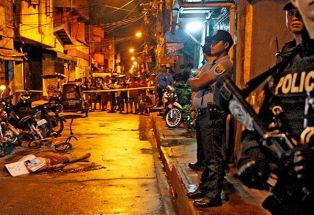UN report: Philippines’ ‘heavy-handed’ focus on drugs, security threats led to serious rights human violations
MANILA, Philippines (Update 1, 1:32 p.m.) — The Philippine government’s “heavy-handed” focus on combating illegal drugs and security threats—coupled with verbal encouragement from top officials—has resulted in grave human rights violations, the United Nations Human Rights Office said.
In a report released Thursday as mandated by the UN Human Rights Council, the UN rights agency said human rights concerns in the Philippines have become “more acute” in recent years as manifested by the “widespread and systematic killing” of thousands of alleged drug personalities.
The campaign against illegal drugs was launched by President Rodrigo Duterte in 2016 after winning elections with his ruthless anti-narcotics and anti-crime platform.
“While there have been important human rights gains in recent years, particularly in economic and social rights, the underpinning focus on national security threats—real and inflated—has led to serious human rights violations, reinforced by harmful rhetoric from high-level officials,” the report said.
“This focus has permeated the implementation of existing laws and policies and the adoption of new measures—often at the expense of human rights, due process rights, the rule of law, and accountability,” it added.
Latest government figures put the number of alleged drug personalities killed in Duterte’s war on drugs at 5,601. But it is significantly lower than the estimates by human rights watchdogs of as many as 27,000 killed.
‘Ominous’ language
The report of the UN rights agency stressed that the Command Memorandum Circular 16-2016, which discusses how the anti-illegal drug campaign Project Double Barrel will be operationalized or implemented, contained language that almost encouraged violations of due process. These terms include “neutralization,” which means to kill.
“Such ill-defined and ominous language, coupled with repeated verbal encouragement by the highest level of State officials to use legal force, may have been emboldened police to treat the circular as permission to kill,” the report said.
The UN office also said that police operations were routinely carried out without warrants and that evidence may have been falsified as it found that “police repeatedly recovered guns bearing the same serial numbers from different victims in different locations.”
“People who use or sell drugs do not lose their human rights,” UN human rights chief Michelle Bachelet said. She is expected to report her office’s findings to the UN Human Rights Council session in Geneva this month.
‘Near impunity’
The UN Human Rights Office also said there has been “near impunity” for drug war killings with only one conviction—for the murder of 17-year-old school boy Kian delos Santos in 2017.
“Despite credible allegations of widespread and systematic extrajudicial killings in the context of the campaign against illegal drugs, there has been near impunity for such violations,” the report said.
The agency stressed the need for independent and credible probes into allegations of human rights violations and international humanitarian law.
“Given the scale of killings and human rights violations this report has documented and given the failure so far of domestic remedies from bringing to justice perpetrators, the high commissioner is calling for independent investigation into the situation, into human rights violations in the Philippines,” Ravina Shamdasani, Philippine report team leader, said.
The report also noted that vilification of dissent and attacks against perceived critics are being “increasingly institutionalized and normalized.”
Last year, the UN Human Rights Council voted to adopt a resolution tabled by Iceland requiring Bachelet to prepare a comprehensive report on the human rights situation in the Philippines.
In an online forum last week, Agnes Callamard—UN special rapporteur on extrajudicial, summary or arbitrary executions—said she is hoping that the report to be presented by Bachelet will have an impact on the next step of the International Criminal Court, which is conducting a preliminary examination into Duterte’s alleged crimes against humanity.
A preliminary examination is not the same as a preliminary investigation and is chiefly concerned with evaluating whether the ICC has jurisdiction over the allegations. Fatou Bensouda, chief prosecutor of the ICC, earlier said her office is seeking to finalize its preliminary examination this year.
- Latest
- Trending






























